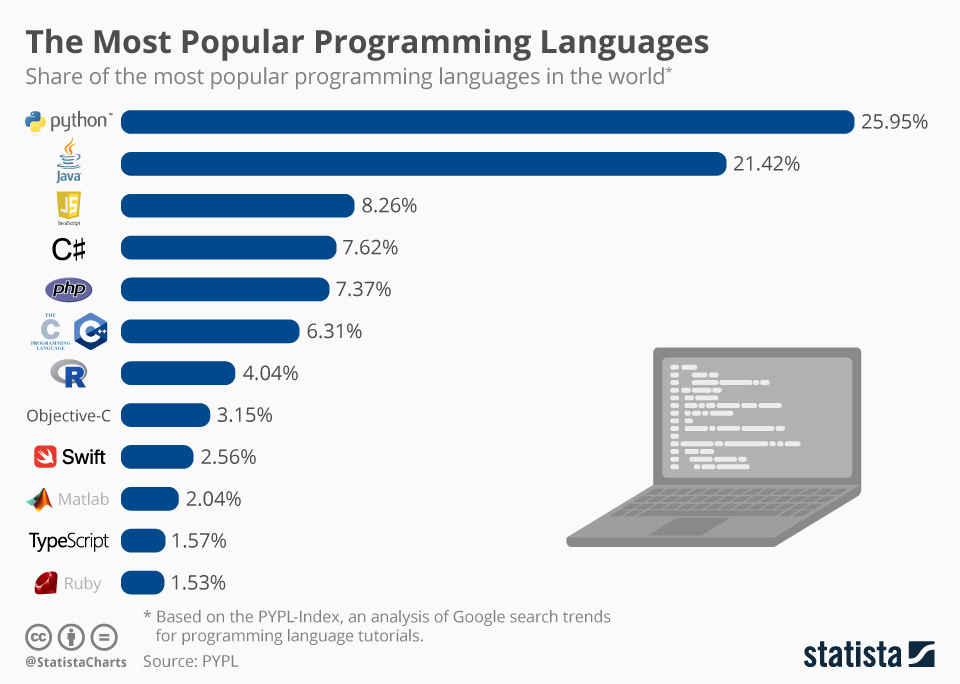Top Programming Languages for Software Engineering
-
by HpYqFcFU
- 330

In the ever-evolving landscape of software engineering, choosing the right programming language is crucial to ensure efficient development, robust applications, and the ability to stay ahead in a highly competitive industry. As technology progresses, the demand for skilled software engineers proficient in specific programming languages continues to soar. In this comprehensive guide, we present the top programming languages that every software engineer should consider mastering to excel in their career.
1. Python: The Swiss Army Knife
Python is the undeniable powerhouse of programming languages, celebrated for its ease of use, readability, and adaptability. With its streamlined syntax, developers can craft impeccable code, minimizing mistakes and maximizing efficiency. The extensive standard library and vast range of third-party packages enable developers to conquer any project, from web development to data analysis, and from artificial intelligence to machine learning. Don’t be left behind – join the Python revolution today!
Python’s popularity can be credited in part to frameworks like Django and Flask that enable quick and efficient web application development. Its importance in scientific computing, data science, and automation further solidifies Python as the top choice for developers of all levels.
2. JavaScript: Powering the Web
When it comes to web development, JavaScript reigns supreme. As a client-side scripting language, it enables developers to create interactive and dynamic websites that engage users. With the rise of Node.js, JavaScript has expanded its reach to server-side programming, making it a versatile full-stack language.
JavaScript has become even more popular thanks to frameworks and libraries like React, Angular, and Vue.js. These tools empower developers to create web applications that are both scalable and packed with features. As JavaScript continues to evolve with the support of a vast community and ongoing advancements, it has become an essential skill for those aiming to become software engineers.
3. Java: Battle-Tested and Versatile
Java has stood the test of time as one of the most reliable and widely used programming languages. Its “write once, run anywhere” approach, facilitated by the Java Virtual Machine (JVM), allows Java applications to run on various platforms without modification.
Java’s versatility makes it an excellent choice for developing enterprise-level applications, Android mobile apps, and backend systems. The availability of frameworks like Spring enhances the Java development experience, providing a strong ecosystem for building scalable and secure applications.
4. C#: The Language for Microsoft Ecosystem
C# by Microsoft: The Perfect Fit for. NET. Known for its simplicity, type safety, and seamless integration with Windows apps, C# is now cross-platform with .NET Core, opening up endless possibilities for developers in any environment.
C# excels in creating Windows desktop applications, web applications using ASP.NET, and games using the popular Unity game engine. As Microsoft’s technology stack continues to evolve, C# remains an indispensable language for developers invested in the Microsoft ecosystem.
5. Go (Golang): The Language of Scalability
Discover the power of Go – the simplicity, performance, and concurrency champion. Developed by Google, Go is the go-to language for lightning-fast, efficient applications. Its unrivaled capabilities make it the perfect choice for creating scalable and high-performance solutions, especially in the world of cloud computing and distributed systems.
Discover the power of Go – the simplicity, performance, and concurrency champion. Developed by Google, Go is the go-to language for lightning-fast, efficient applications. Its unrivaled capabilities make it the perfect choice for creating scalable and high-performance solutions, especially in the world of cloud computing and distributed systems.
6. TypeScript: JavaScript with Superpowers
Enhance the power of JavaScript with TypeScript as applications become more intricate. TypeScript brings static typing, allowing developers to detect errors early and improve code maintainability and scalability.
With features like interfaces, classes, and decorators, TypeScript takes JavaScript to the next level, allowing developers to confidently create robust applications. Seamlessly integrating with existing JavaScript projects and backed by popular frameworks like Angular and React, TypeScript is the language of choice for scalable development.
7. Rust: A New Paradigm in System Programming
Rust is a modern system programming language that prioritizes safety, concurrency, and performance. Developed by Mozilla, Rust has gained a devoted following for its unique approach to memory safety, achieved through a powerful borrow-checker that prevents common programming errors like null pointer dereferences and data races.
When it comes to building systems-level software, compilers, operating systems, and performance-critical applications, no language compares to Rust. Its unique blend of safety and performance has made it a top choice for developers aiming to craft robust and efficient software. Join the growing community of Rust enthusiasts and experience the unparalleled power and reliability it offers.
Conclusion
In conclusion, as a software engineer, mastering the right programming languages can significantly impact your career trajectory and open doors to exciting opportunities. Python’s versatility, JavaScript’s dominance in web development, Java’s stability, C#’s integration with the Microsoft ecosystem, Go’s scalability, TypeScript’s type safety, and Rust’s safety in system programming, are all valuable skills that can set you apart in the job market.
Choosing the right programming language depends on your goals and project requirements. Keep yourself updated with the latest trends, explore new technologies, and constantly improve your skills to stay ahead in the ever-changing software engineering field.
In the ever-evolving landscape of software engineering, choosing the right programming language is crucial to ensure efficient development, robust applications, and the ability to stay ahead in a highly competitive industry. As technology progresses, the demand for skilled software engineers proficient in specific programming languages continues to soar. In this comprehensive guide, we present the…
In the ever-evolving landscape of software engineering, choosing the right programming language is crucial to ensure efficient development, robust applications, and the ability to stay ahead in a highly competitive industry. As technology progresses, the demand for skilled software engineers proficient in specific programming languages continues to soar. In this comprehensive guide, we present the…
